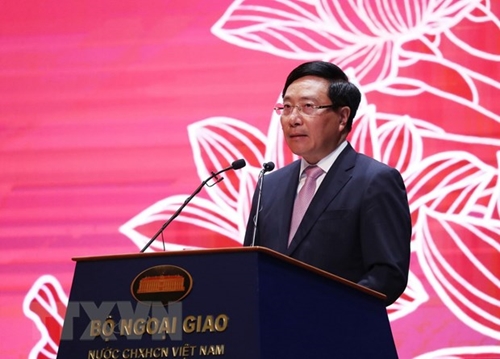During the 75 years of formation and development and under the leadership of the Communist Party of Vietnam and President Ho Chi Minh - Vietnam’s first Foreign Minister - the diplomatic sector has always served the nation and the people and contributed to the country’s glorious victories.
In the resistance wars against French colonialists and U.S. imperialists, revolutionary diplomacy became an important front of strategic significance that stood shoulder-to-shoulder with the military front to bring about victories.
    |
 |
|
Deputy Prime Minister and Foreign Minister Pham Binh Minh delivers a speech at an event marking the diplomatic sector's 75th founding anniversary. |
The diplomatic sector pioneered the creation of an international front in support of Vietnam’s struggle for national liberation and reunification, Minh wrote, adding that the sector’s victories in negotiations in Geneva in 1954 and in Paris in 1973 were important milestones in the country’s odyssey to liberation and reunification.
During post-war reconstruction, he went on, diplomacy played a crucial role in ensuring the country escaped from political isolation and economic embargo, resolved shortcomings between Vietnam and neighboring countries and powers, and created breakthroughs in Vietnam’s external relations.
Vietnam has diplomatic ties with 189 of the 193 U.N. members, together with stable and long-term relations with 30 comprehensive or strategic partners.
According to Minh, the diplomatic sector provided consultation to the Party and the Government on strategic steps and measures in international economic integration through the signing of important free trade agreements (FTAs), such as the EU-Vietnam FTA and the Comprehensive and Progressive Agreement for Trans-Pacific Partnership (CPTPP), and at the same time cooperated closely with relevant ministries and sectors to boost international integration in the fields of security-defense, socio-culture, and science-technology.
The diplomatic sector has helped Vietnam fulfill its international missions, in particular as the chair of the Francophone Summit (1997), ASEAN (1998, 2010, and 2020), the Asia-Europe Meeting (ASEM) (2005), and APEC (2006 and 2007). Of note, it contributed to organizing the second U.S.-Democratic People’s Republic of Korea Summit in Hanoi last year, helping to boost dialogue, mediation, and peace on the Korean Peninsula.
Along with security and defense, diplomacy has made effective contributions to safeguarding the nation’s sovereignty and territorial integrity. Together with relevant ministries and sectors, the sector has exerted efforts to negotiate and build land borders of peace, friendship, and development with Laos, Cambodia, and China, and coordinated with defense and public security forces in safeguarding the country’s sovereignty and sovereign right in the East Sea (South China Sea), Minh wrote.
He affirmed that cultural diplomacy has promoted the image of a Vietnam rich in cultural characteristics. UNESCO recognition of 39 cultural heritages of Vietnam also saw contributions from the diplomatic sector.
The diplomat noted that world economic recessions, increasing strategic competition among world powers, challenges to maritime security, complex developments in the East Sea, and arising non-traditional security challenges such as disease, water resources security, and the environment have directly affected Vietnam’s security environment and development.
He stressed the importance of diplomacy in ensuring a peaceful and favorable environment for development and safeguarding national sovereignty and territorial integrity, as well as the necessity to build a modern diplomatic sector to contribute more to the cause of nation construction and defense.
Source: VNA